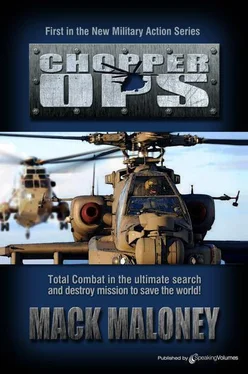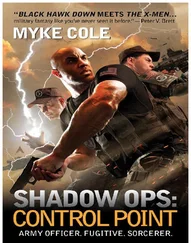Mack Maloney - Chopper Ops
Здесь есть возможность читать онлайн «Mack Maloney - Chopper Ops» весь текст электронной книги совершенно бесплатно (целиком полную версию без сокращений). В некоторых случаях можно слушать аудио, скачать через торрент в формате fb2 и присутствует краткое содержание. Город: Naples, FL, Год выпуска: 2011, ISBN: 2011, Издательство: Berkley, Жанр: Боевик, на английском языке. Описание произведения, (предисловие) а так же отзывы посетителей доступны на портале библиотеки ЛибКат.
- Название:Chopper Ops
- Автор:
- Издательство:Berkley
- Жанр:
- Год:2011
- Город:Naples, FL
- ISBN:978-1-61232-148-6
- Рейтинг книги:3 / 5. Голосов: 1
-
Избранное:Добавить в избранное
- Отзывы:
-
Ваша оценка:
- 60
- 1
- 2
- 3
- 4
- 5
Chopper Ops: краткое содержание, описание и аннотация
Предлагаем к чтению аннотацию, описание, краткое содержание или предисловие (зависит от того, что написал сам автор книги «Chopper Ops»). Если вы не нашли необходимую информацию о книге — напишите в комментариях, мы постараемся отыскать её.
Chopper Ops — читать онлайн бесплатно полную книгу (весь текст) целиком
Ниже представлен текст книги, разбитый по страницам. Система сохранения места последней прочитанной страницы, позволяет с удобством читать онлайн бесплатно книгу «Chopper Ops», без необходимости каждый раз заново искать на чём Вы остановились. Поставьте закладку, и сможете в любой момент перейти на страницу, на которой закончили чтение.
Интервал:
Закладка:
But as Delaney and the others learned that day—and would learn many times in the next week—they had assumed wrong.
The C-5’s sat on the runway for hours, not moving, their insides getting hotter with each passing minute. Finally the unit was unloaded, aircraft and all. It was dark by this time. A half mile away was a small port facility. At its dock was the lowliest, crappiest-looking cargo freighter Delaney could have ever imagined.
Under instructions from Smitz, the unit pushed the choppers over to the dock, which, despite much grunting and groaning, took under an hour. Once they were at the dock, an ancient crane lifted the choppers onto the freighter, putting the Hinds into the hold first, and then settling the big Hook and the even bigger Halos onto the deck. Once they were in place, the crew covered the helicopters with black tarpaulin and then arranged empty metal containers on top of them, hiding them completely. Then the unit itself was loaded aboard.
Then they sailed.
Delaney had gotten sick soon after chow the next morning. At first he thought it was the food. The freighter was so dirty and grimy and rusty, Delaney was convinced the CIA had dressed it up to look that way, and the food was absolutely horrible. When Delaney found himself bent over the railing an hour later, he would have bet his lunch the greasy eggs had made him sick.
But then he noticed the ship was rolling. Up and down, up and down. And then he noticed that there was a nauseous rhythm to this motion. And once that thought was firmly entrenched in his mind, there was no turning back. He became sick and had remained sick ever since.
He’d spent so much time on the rail, he actually had a favorite spot to throw up from: about midships, port side. Crew members—when he saw them—totally ignored him. Members of the unit did too. The Marines had done their morning calisthenics no more than fifty feet away from him and no one had given him a sideways glance. He was insulted and relieved at the same time.
Only Norton showed him any sympathy, bringing him pints of water so he wouldn’t get totally dehydrated. But vomiting was a solitary practice, so Delaney just took the water and waved off any of Norton’s attempts to converse or distract him.
After more than one hundred hours of this, Delaney was convinced that Hell actually floated on an ocean.
It was now the fifth day and though Delaney didn’t know it, his nightmare was about to end.
It was Norton who brought him the news. The pilot arrived on deck with a pint of water and, for the first time, a cup of coffee.
“You don’t expect me to drink that, do you?” Delaney asked, looking at the steaming mug.
“Yeah, I do,” Norton replied.
Norton looked different. It took Delaney a moment to realize why. Finally it hit him. Norton was unshaven, in need of a haircut, and his clothes weren’t exactly spiffy. For the first time ever, his friend actually looked unkempt.
“Look in a mirror yourself,” Norton told Delaney, reading his thoughts. Then he passed the coffee cup into Delaney’s shaking hands.
“What makes you think I can actually keep this down?” Delaney asked him.
“Because I have good news for you,” Norton replied.
Delaney stood up straight for what seemed like the first time in years. “And that is?”
Norton pointed to something just off their bow. They were in a thick fog, and Delaney tried hard to focus his bleary eyes. After a few moments, he could just barely make out the outlines of something floating in the middle of the bluish-green water. It looked like an extremely large sludge barge.
“What the hell is that thing?” he managed to blurt out.
“It’s our destination,” Norton told him. “We’re finally here.”
Their destination was named Heaven 2 . It was presently anchored near the island of Halul, about fifty miles off the coast of Qatar in the lower Persian Gulf.
It was an old sludge barge, 250 feet long and sixty feet wide, and originally built to move all kinds of unsavory cargo up and down the Red Sea. It was rusty, what paint that remained was peeling, and the vessel had a distinct 15-degree list to the port side. There was a small control house at its bow, and a steering hut/chart room on its stern. Belowdecks there was room enough for a crew of six, a mess, a head, and little else.
The CIA had purchased the barge in 1987, and brought it into the Persian Gulf in order to run small amphibious operations against Iran. But it hadn’t seen active duty since 1993. And it hadn’t been cleaned since 1991.
A thick wooden platform covered the top of its hull; this created an area large enough to carry all five of the unit’s helicopters with little room to spare. The barge moved about by means of two tugboats, and from the air or to the uneducated eye, it could have passed for a scow. A crew of six part-time CIA-paid seamen kept the barge afloat.
The freighter docked with the vessel and painstakingly unloaded the five helicopters. It was about one hour before sunrise when this operation began, and the fog drifting up from the mouth of the Gulf was getting thicker. Together, the mist and the dim light gave the unloading operation some much-needed natural cover.
The entire unit pitched in getting the choppers onto the platform and back under wraps. They were under orders to handle the aircraft “as if they were handling eggs.” One of many sticking points of the operation was the maintenance of the choppers. The Army Aviation guys knew a little bit about fixing the Russian machines. Plus a dozen air techs from Seven Ghosts Key had come along for the mission. But between them, they could fix only small problems such as frayed wires, bum generators, blown fuses, and the like.
If anything major went wrong with one of the choppers—if a critical part failed or broke—the mission would be doomed.
One hour after getting the choppers stowed away, Smitz called a meeting in the barge’s tiny chart room.
All of the principals drifted in. They were tired, dirty, anxious. Delaney, still pale, asked why the barge didn’t have a swimming pool. No one laughed, least of all Smitz. Always earnest, the young CIA officer especially didn’t appear to be in the mood for any jokes now. In fact, he’d seemed to have aged ten years during the five-day voyage. His beard was erupting, his hair was tousled. He was wearing a tattered pair of Army fatigues. He certainly wasn’t sporting the schoolboy look any longer. He was now one of them.
“You’re all finally going to get your wish,” he began soberly once everyone had arrived. “Though it’s not how I imagined it, this is what you’ve been waiting for: ‘the motherfucker of all briefings.’”
There was a round of tired, mock applause as Smitz laid out a long piece of paper that had scrolled out of his NoteBook’s printer. It was about three feet long, six pages in all. It was crowded with text, maps, photos, crude illustrations, and code-word lists. It looked very unimpressive.
“These are our operational orders,” Smitz said, examining the document. “They were just sent by my office. Why it took so freaking long, I’ll never know. But here they are. Here’s what they want us to do.”
He flattened out the length of paper and held it in place with help from some empty soda bottles found in a nine-year-old bag of trash. He indicated the first photograph on the document. It was a satellite image of a very deep valley surrounded by some very high mountains. There were a half-dozen buildings lining one side of what looked to be a perfectly straight two-lane asphalt highway. One of these buildings looked like a Western-style ranch.
“We’re attacking Arizona?” Delaney quipped.
Читать дальшеИнтервал:
Закладка:
Похожие книги на «Chopper Ops»
Представляем Вашему вниманию похожие книги на «Chopper Ops» списком для выбора. Мы отобрали схожую по названию и смыслу литературу в надежде предоставить читателям больше вариантов отыскать новые, интересные, ещё непрочитанные произведения.
Обсуждение, отзывы о книге «Chopper Ops» и просто собственные мнения читателей. Оставьте ваши комментарии, напишите, что Вы думаете о произведении, его смысле или главных героях. Укажите что конкретно понравилось, а что нет, и почему Вы так считаете.












